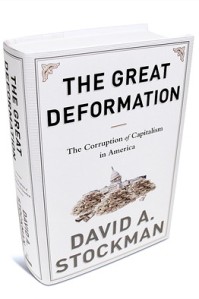This time he makes a bit of sense…excerpted from a book review in the WSJ:
“The Great Deformation” is more than a polemic aimed at government check-writing. Mr. Stockman, who has been mostly unhappy with both Democratic and Republican policies for three decades, is appalled by the ruling class’s belief that economic prosperity flows from “macromanagement by the state, rather than from free market interaction.” Everywhere he sees sweetheart deals between government and industry, often engineered by lobbyists. The energy sector in particular he views as a sewer of subsidy and false “green” promises. Meanwhile, corporate America enters into reckless deals in part because borrowing is much too cheap, thanks to skewed tax and monetary policies.
As for the real-estate and banking crash of 2008, Mr. Stockman makes the case that nearly every policy response made things worse. He derides the interventions by Henry Paulson, Mr. Bush’s Treasury secretary, as “a de facto coup d’etat by Wall Street, resulting in Washington’s embrace of any expedient necessary to keep the financial bubble going—and no matter how offensive it was to every historic principle of free markets, sound money, and fiscal rectitude.” The too-big-to-fail doctrine, he believes, allows bad actors to thrive at taxpayer expense. The auto industry didn’t need $20 billion in federal money, Mr. Stockman says; it needed “a cold bath of free-market house cleaning.” As for the Federal Reserve, he claims that in 2008 it was guilty of “spraying an alphabet soup of liquidity injections in every direction”—a cheap-money strategy that Ben Bernanke is still employing five years later to prop up stock-market valuations.
There is something tonic about all this angry complaint, and “The Great Deformation”—though about twice as long as it needs to be—is a welcome thrashing of the ruling classes in both parties. Economic elites in Washington and on Wall Street routinely pat themselves on the back and tell us that, five years after the meltdown, their “quick and decisive” interventions prevented a 1929-style collapse. Mr. Stockman isn’t buying it. “The Main Street banking system was never in serious jeopardy, ATMs were not going dark, the money market industry was not imploding,” he writes. The smaller banks in 2008, he notes, had more than $2 trillion in safe assets on their books.
It may well be that the danger of a return to 1929 was grossly exaggerated. Whether policy makers should have assumed it was—in the midst of a panic—is an open question. The challenge for Mr. Stockman, and for free marketers in general, is to make the case that the American economy would be in better shape today if we hadn’t borrowed $5 trillion and bailed out Wall Street investment banks, the insurer AIG and General Motors—let alone home buyers with toxic mortgages. But even if a modest bailout was justified to rescue the soundness of the financial system, Mr. Stockman’s essential critique is accurate: that Fed and federal officials sheltered malefactors from gargantuan losses and made current taxpayers—and future ones—pick up the tab.
What is true is that today we have a kind of “deformed” capitalism, with private gains and socialized losses. Mr. Stockman says that it is too late to change things and that a crash is unavoidable. He has been wrong before. We can only hope that he is wrong again.
